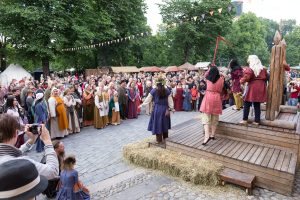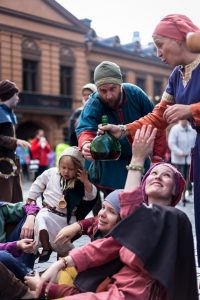Reima Välimäki, postdoctoral researcher, TIAS
Like the previous blog post, https://blogit.utu.fi/collegia/2020/06/05/explaining-quantum-physics-with-arts-and-games/ my text discusses outreach: a part of a researcher’s work that might not be rewarded as a curriculum activity, but which is extremely rewarding in itself.
I am a medieval historian. Some of my research has been a very technical study of medieval manuscripts, their authorship, dating and provenance. Fundamental research, but not stuff for popular books. Yet, in addition to that, I have always felt that an academic historian’s duty is, in addition to research and teaching, to be an expert in the service of society. This means that one must be able to a certain extend to step outside one’s comfort zone, the narrow research area in which one publishes their journal articles.
For me, such an opportunity has been Turku Medieval Market, an annual medieval fair at the heart of historical Turku, in the Old Market Place near the Cathedral. It is the oldest and largest event of its kind in Finland and with its ca. 150 000 visitors one of the major summer events. Of course, not this year. As I am writing this, the Medieval Market is taking place online due to the COVID-19 restrictions. If you want to check it out, the programme is available also after the event days 25–28 June: http://keskiaikaisetmarkkinatverkossa.fi/

Image 1: Medieval Market attracts every year well over 100 000 visitors from Finland and abroad. Photo: Sami Maanpää/Keskiaikaiset markkinat
I can confess that the Medieval Market was one source of inspiration that led me to study history at the University of Turku. I first participated in the festival when I was in high school, and there has always been a connection between the Medieval Market and my academic career as a medieval historian. As a student, I was a trainee and later an employee at the production of the event. Then as a PhD student, I joined the board of the association organising the event. And now, as a postdoctoral researcher, I am the chairperson of the organising association, as well as the historical expert of the festival.
A unique thing in Turku Medieval Market is its large, free theatre performances. Every summer, around 80 amateur actors play scenes of life in medieval Turku. Besides, music, dance, circus and handcraft shows, as well as about one hundred market stalls, create the atmosphere. And in addition to arts and entertainment, there is also educational programme such as lectures (https://www.youtube.com/watch?v=s08iL_Pe6uY) organised together with Turku Centre for Medieval and Early Modern Studies (https://www.utu.fi/fi/yliopisto/humanistinen-tiedekunta/tucemems). Each year has its theme year. Next year, when hopefully the event can take place again, the audience will visit Turku in 1395. Or rather, a medievalist fiction of Turku in 1395, staged in the middle of nineteenth-century buildings.

Image 2: A scene from 2016 Medieval Market. Photo Ikaros Ainasoja/ Keskiaikaiset markkinat
Everyone knows that the festival is fiction. Yet, there is a quest for authenticity, both from the part of individual participants and from the organisation behind the festival. We know that we cannot reach the medieval past and that people come there for fun, but we also want to teach about medieval history. Nowadays, very little is taught about medieval history in schools in Finland, which means that most people encounter medieval history mainly in museums, churches and events like the Medieval Market – and obviously in cultural products inspires from the Middle Ages, such as TV-series and games. As the Medieval Market is an extremely popular event, it also has a certain responsibility for how it depicts history.
This is where a historical expert comes in. There is, of course, a fact-checking task. You cannot have persons staged in 1350 talking about the printing press, invented some hundred years later. A scriptwriter and director would also need background information. If one depicts events set in 1495, one should take into account the fact that in that year a plague epidemic wiped out most of the population in nearby Naantali.
More important, however, is the broader vision of how to present the past. In recent years, the Medieval Market has put a lot of effort to present history in a way that is not only interesting and, within practical limitations and artistic freedom, accurate, but also inclusive and respectful. Sometimes one can see that medieval people are presented as childish, noisy and unable to control their base impulses. This carnivalistic tradition of presenting the Middle Ages can be entertaining to some. Still, we should not reconstruct past persons as our opposites, counter-images that flatter us. Yes, the codes of conduct were different in the Middle Ages, but in many ways, the social norms were stricter than now. Theatre depicting past people should not turn them into comical characters with modern problems: it is both more exciting and more educating to imagine possible medieval challenges and encounters. This is what we have tried to do in the short clip filmed for this year, available on Youtube. It is unfortunately only in Finnish, but it presents a scene where a wealthy burgher makes his last will. Events caused by it to his family and hirelings will start to unroll: https://www.youtube.com/watch?v=KfYo6AKmDsw
What is also required is an awareness that both preserved medieval sources and most of the studies describe only stories of a fraction of the population. In the case of medieval Turku, mostly men and mostly burghers, clergy and nobility. But what about the rest? We know hardly anything about servant maids, day labourers or children. Here, one can benefit from the artistic freedom of fiction: one can create possible and probable histories and make educated guesses. Luckily, there is enormous interest from the part of amateur actors and audience to hear about the life of ordinary people.
What then, does a researcher get from this? I admit I would not do it if it would not be fun and exciting. Career-wise the hours put to acting as a historical expert are perhaps not the most beneficial. And to be clear, I do it all pro bono. Yet, as a medieval historian, I also learn a lot. Many of the questions are challenging and require a different attitude than writing a research article. In the end, it all comes down to what I think about a researcher’s role in society. Why would I study medieval history, if I were not willing to share my knowledge with a vast, interested audience?

thank you